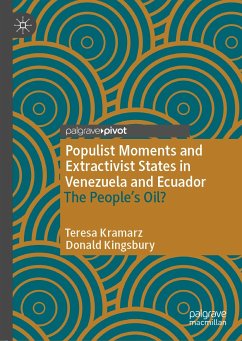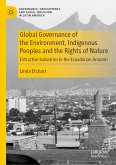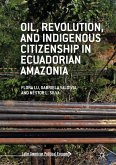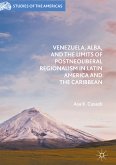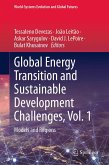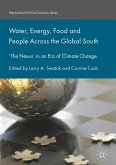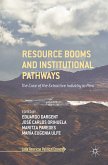"Few issues have perplexed scholars and practitioners of Latin American politics like the rise of leftwing populism. In this book Kramarz and Kingsbury provide a compelling account of how and why fossil fuels have come to dominate nationalist priorities and political possibilities in Ecuador and Venezuela. Essential reading for anyone interested in Latin American politics and development."
-Craig Johnson, Professor and Director, Guelph Institute of Development Studies, University of Guelph, Canada
"This book conjoins a theoretical discussion about the intimate and reinforcing relationship between extractivism and populism with a novel description of how these themes have affected Ecuador and Venezuela. It is an engaging book and very useful contribution."
-Craig Johnson, Professor and Director, Guelph Institute of Development Studies, University of Guelph, Canada
"This book conjoins a theoretical discussion about the intimate and reinforcing relationship between extractivism and populism with a novel description of how these themes have affected Ecuador and Venezuela. It is an engaging book and very useful contribution."
-Scott Morgenstern, Professor of Political Science and Director of Pitt's Center for Latin American Studies, University of Pittsburgh, USA
Thisbook addresses the intersection of extractivism, populism, and accountability. Although populist politics are often portrayed as a driver of poor environmental governance, Populist Moments and Extractivist States identifies it as an intervening variable at best - one that emerges in response to the accountability deficits of extractive states. Case studies in Venezuela - for many, the prototypical petrostate - and Ecuador - which exchanged agribusiness dependency for oil decades later - illustrate how extractive states are oriented by a colonial logic of export and service. This logic regulates state-society-nature relationships and circumscribes avenues for local stakeholders to hold public officials and extractive industries to account for environmental and human harms. Populist moments of the early 21st century across Latin America responded to these conditions, promising more equitable and sustainable futures. However, rather than reversing the technocracy, verticalism, and exclusion of the recent past, populist moments often intensified and legitimated them in the drive to maximize and distribute resource rents. The result has been cyclical, as populist moments of hope and rupture fall prey to the extractivist states they tried, and failed, to replace.
Teresa Kramarz is Associate Professor in Global Affairs at the University of Toronto, Canada.
Donald V Kingsbury is Assistant Professor in Latin American Studies and Political Science at the University of Toronto, Canada.
Thisbook addresses the intersection of extractivism, populism, and accountability. Although populist politics are often portrayed as a driver of poor environmental governance, Populist Moments and Extractivist States identifies it as an intervening variable at best - one that emerges in response to the accountability deficits of extractive states. Case studies in Venezuela - for many, the prototypical petrostate - and Ecuador - which exchanged agribusiness dependency for oil decades later - illustrate how extractive states are oriented by a colonial logic of export and service. This logic regulates state-society-nature relationships and circumscribes avenues for local stakeholders to hold public officials and extractive industries to account for environmental and human harms. Populist moments of the early 21st century across Latin America responded to these conditions, promising more equitable and sustainable futures. However, rather than reversing the technocracy, verticalism, and exclusion of the recent past, populist moments often intensified and legitimated them in the drive to maximize and distribute resource rents. The result has been cyclical, as populist moments of hope and rupture fall prey to the extractivist states they tried, and failed, to replace.
Teresa Kramarz is Associate Professor in Global Affairs at the University of Toronto, Canada.
Donald V Kingsbury is Assistant Professor in Latin American Studies and Political Science at the University of Toronto, Canada.
Dieser Download kann aus rechtlichen Gründen nur mit Rechnungsadresse in A, B, BG, CY, CZ, D, DK, EW, E, FIN, F, GR, HR, H, IRL, I, LT, L, LR, M, NL, PL, P, R, S, SLO, SK ausgeliefert werden.
Es gelten unsere Allgemeinen Geschäftsbedingungen: www.buecher.de/agb
Impressum
www.buecher.de ist ein Internetauftritt der buecher.de internetstores GmbH
Geschäftsführung: Monica Sawhney | Roland Kölbl | Günter Hilger
Sitz der Gesellschaft: Batheyer Straße 115 - 117, 58099 Hagen
Postanschrift: Bürgermeister-Wegele-Str. 12, 86167 Augsburg
Amtsgericht Hagen HRB 13257
Steuernummer: 321/5800/1497
USt-IdNr: DE450055826
Bitte wählen Sie Ihr Anliegen aus.
Rechnungen
Retourenschein anfordern
Bestellstatus
Storno

